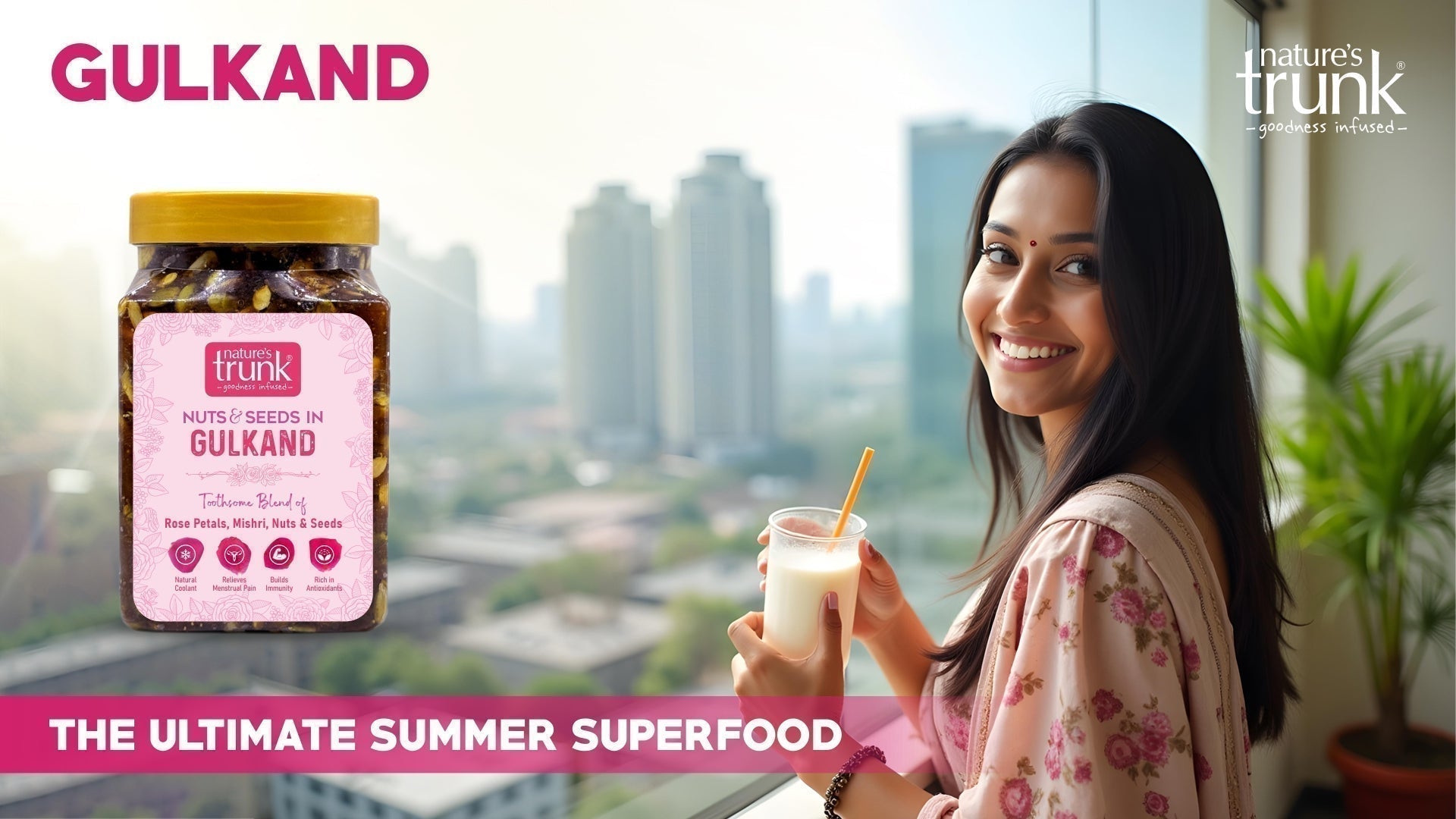Gulkand-The Ultimate Summer Superfood

You may get tired, dehydrated, and irritable due to the scorching heat. Headaches, weariness, acidity, and digestive issues all come with heatwaves. But what if there was a delicious way to cool down naturally? The sun-cooked Gulkand, an age-old Ayurvedic preparation made from Damask rose petals and Daga Mishri (Rock Sugar) is the answer! This natural cooling agent not only cools your body but also has multiple benefits. Let’s see why Rose Petals Jam is your ultimate summer companion.
What’s Gulkand?
Gulkand is a traditional rose petal jam made from Damask rose petals with Daga Mishri (Rock Sugar) under the sun for several weeks. This natural process preserves the nutrients of the roses and enhances their cooling and remedial properties. Unlike artificial flavours loaded with preservatives, Rose Jam is a pure and nutritional remedy that has been used in Ayurveda for centuries.
Why is Gulkand (Rose Petal Jam) the Perfect Summer Superfood?
Many health benefits can be obtained from consuming Gulkand. Due to its high antioxidants and probiotics, Gulkand helps the body fight against free radicals and reduce oxidative stress. It’s the perfect summer snack, as the natural sugars give you a quick energy boost.
1. Natural Body Coolant
Gulkand regulates body temperature and reduces the effect of heat. It’s especially good for those who are prone to heat strokes and sunburns.
2. Prevents Acidity and Indigestion
Summers lead to acidity and digestive issues. Gulkand’s antioxidants neutralizes stomach acid, and prevent heartburn and bloating.
3. Boosts Energy and Fights Fatigue
Feeling drained due to excessive sweating? Gulkand restores lost energy levels and keeps you fresh and active throughout the day.
4. Aids in Hydration
The natural probiotics in Gulkand keep your body hydrated and prevent dehydration and dry skin.
5. Improves Skin Health
Summers can make your skin dull, rough, and irritated. The antioxidants in sun-cooked Gulkand detoxify the body and give you a healthy glow from within.
6. Supports Gut Health
A healthy summer depends on a happy gut! Gulkand is a natural probiotic that promotes digestion and eases constipation and overall gut health.
7. Promotes Relaxation and Lowers Stress
Summertime exhaustion can take a toll on your Mental health. Gulkand has calming properties that help reduce stress, improve mood, and promote peaceful sleep.
Sun- Cooked Gulkand with Daga Mishri What Makes It Special?·
Not all Gulkand’s are the same! Sun-cooked Gulkand made with Daga Mishri stands out due to its traditional preparation method.
Slow Sun-cooking– rather than artificial heat, the mixture is naturally cooked under the sun for weeks, ensuring all nutrients remain complete.
Daga Mishri( Rock Sugar) used rather than Regular Refined Sugar – Daga Mishri is a mineral-rich, unprocessed sweetener that enhances the cooling effect of Gulkand.
Preservative-Free and Pure – Unlike commercial syrups, sun-cooked Gulkand is free from artificial complements, making it a healthier choice.
How to use Gulkand in Summer?
Gulkand is good for overall health if consumed daily. But because of its natural sugar content, one needs to be moderate. You can include Rose Jam in your daily diet by adding it to drinks, smoothies, or desserts. There are many ways to enjoy Gulkand and beat the summer heat.
Consume Directly: Eat a spoonful of Gulkand on an empty stomach for maximum benefits.
Mix in Milk: Mix a tablespoon of Gulkand in cold milk for a summer cool drink.
Spread on Bread or Chapathi: Use Gulkand as a spread for a healthy and tasty snack.
Mix in Smoothies: Add Gulkand to fruit smoothies for a cool and nutritious twist.
Use as a dessert topping: Drizzle Gulkand over yogurt, ice cream, or puddings for a treat.
Make Paan Gulkand: Mix it with nuts and seeds for a traditional, digestion-friendly paan experience.
In Conclusion: Should You Add Gulkand to Your Summer Diet?
Yes! Gulkand isn’t just a sweet treat; it’s a natural cooling agent with loads of benefits. From keeping your body cool to perfecting digestion and skin health, this ancient remedy is a must-have during the hot months. conclude with sun-cooked Gulkand made with Daga Mishri for the purest, most beneficial experience.
So, why struggle with summer heat when you have nature’s sweetest result? Start adding Gulkand to your daily routine and feel the difference!
Know More
1. How much Gulkand should I consume daily?
1–2 spoons per day is enough to enjoy its cooling and health benefits.
2. Is Gulkand suitable for diabetics?
Traditional Rose Jam has natural sugars, so diabetics should consume it in moderation or opt for sugar-free versions.
3. Can Gulkand help with mouth ulcers?
Yes! Gulkand’s cooling properties can soothe and heal mouth ulcers naturally.
4. Is Gulkand safe for children?
Yes, Gulkand (Rose Petal Jam) is a natural and safe option for kids to keep their bodies cool this summer.
5. What is the best time to have Gulkand?
After eating a meal, take a spoonful of Gulkand to aid in digestion.
Have you tried Gulkand before? Share your favourite way to enjoy this summer in the comments!
Related articles
7 Reasons to Switch to Millet Flakes for a Healthier Morning
When your mornings seem to be hurried, boring or reliant on sweetened cereals, you are not the only one. Majority of the people take the quickest food they can get even when they are full in an hour. But how about a breakfast that is fast and nutritious, a breakfast that provides your body with energy, that helps you feel full and enables you to stay healthy. That is where Breakfast Millet Flakes come in. Millet based foods are the smarter choice to normal cornflakes or processed cereals as more individuals seek healthier and cleaner breakfast options. High in fiber, minerals, and sluggish releasing energy, Unprocessed Millet Flakes would be an excellent choice to every family, fitness enthusiast, and busy individual. The following are 7 strong reasons of why switching to Millet Flakes can help change your mornings. 1. A Natural Source of Sustained Energy Unlike sweet cereals which cause a burst of energy that leaves the body exhausted in the near future, Millet Flakes contain a slow flow of energy. This is a constant energy that keeps you on the go, concentrating and stable in the morning. Millets have a slower digestion rate, and this makes blood sugar levels constant - a big plus among office goers, students and anyone who needs to stay focused and not experience mid-morning crashes. 2. Helps with Weight Management Trying to manage weight but struggling with cravings? Millet Flakes can help. They contain a lot of dietary fiber thus you feel satisfied. You do not feel the need to over eat or take junk food because when you are not always hungry you will not be tempted. Fiber enhances digestion, aids in metabolism, and makes your stomach light yet full a combination that is ideal in weight balancing. 3. Great for Gut Health The gut has a significant role in digestion, immunity and so on. This is why it is important to select gut-friendly breakfast. Unprocessed, Raw Millet Flakes contain a lot of pre-biotic fiber that nourishes the beneficial bacteria of your intestines. This enhances the digestive system, lowers bloating and facilitates bowel movement. When you tend to feel heavy, sluggish or uncomfortable after eating a breakfast, then millet flakes can bring the comfort your stomach has been missing. 4. Rich in Minerals that Your Body Needs Millets have naturally great minerals such as: · Iron · Calcium · Magnesium · Phosphorus · Potassium These minerals help build stronger bones, enhance blood flow, improved muscle activities as well as enhanced vitality. If your usual breakfast doesn’t add much nutrition, Millet flakes can fill those gaps easily. 5. A Clean Alternative to Sweetened Cereals The majority of the ready-made cereals are packed with sugar, unreal flavours, or processed grains. Raw Flakes of Millet, however, are nutritive in their pure form without added unnecessary components. They're: · Naturally gluten-free · Low in sugar · High in fiber · Free from refined flours · Made from Raw Millets This change can be of immense benefit to those parents who want to offer healthier breakfast food choices to the children. 6. Fits Easily into Busy Lifestyles Millet Flakes are ideal in the individuals who prefer to have something healthy without spent an additional time in the kitchen. They are quick, easy and enjoyable indeed. You may have your Flakes of Millet in several ways: · With warm milk · In smoothie bowls · As a fruit parfait · Sprinkled over curd · Mixed with nuts and honey Only 2-3 minutes and you will have a breakfast to sustain you throughout the day. 7. A Better Choice for Kids Too If your child refuses traditional Indian breakfasts and asks for packaged cereals, Millet Flakes are the healthier middle-ground. They offer the crunch and taste kids love - without the sugar crash. Plus, they support growth by providing protein, iron, and essential minerals needed for active, growing bodies. This makes millet flakes a great family-friendly option for mornings, school tiffins, and even quick evening snacks. Final Thoughts: The Easy Morning Switch that Can Change your entire day A healthy morning doesn’t require expensive superfoods or complex recipes. One little adjustment can sometimes transform your energy, digestion and daily performance, e.g. substitute cornflakes with millet flakes. Millet Flakes give you: · Steady energy · Better digestion · Clean nutrition · Long-lasting fullness · A healthier start to everyday Millet Flakes are a breakfast that supports your body in a natural way, so, in case you are in need of fast breakfast to start your day, this is the change that your morning will be glad to have.
Clean eating in a busy Lifestyle: Quick tips that actually works
Do you find yourself too busy to eat? Working late into the night, having meetings one after another, or looking after your family and home can lead you to grab fast food or skip meals altogether. Busy professionals and parents will typically opt for convenience over health. A bag of potato chips, soda, or a candy bar will satisfy you, but they will drain you soon enough. Here's the truth- clean eating doesn't have to be hard. You don't require special cooking gadgets or a lot of meal prep time to eat clean. By strategically making a few small changes, you can power your body significantly without necessarily turning to processed food. Clean eating is really about having better choices in an already busy life. This will provide us with the opportunity to discuss what clean eating is, quick replacements, snack ideas and habits that succeed. Understanding Clean Eating Clean eating is just selecting whole foods which have not been processed, instead of packaged or fake ones. That is, to consume food in a state that's close to the way it grows naturally - fruits, vegetables, grains, nuts, seeds, and lean proteins. For the active, clean eating is more critical. Healthy food gives energy for extended hours, increases focus, and sustains long-term health. Ingesting meals or consuming instant food may give energy in an instant, but usually leads to exhaustion, mood fluctuation, or indigestion. Here is the reality: Clean eating isn't about gourmet diets or high-end recipes. Clean eating is simply an everyday expression of your food choices - it is swapping one bad idea or habit for a better one. Quick Healthy Swaps for Busy People Swap Nuts and Seeds for Chips Chips are laden with empty calories, even though they can be tasty. Not as easy to access but far more filling is a handful of Cashews, Almonds, or Pumpkin seeds. They give you protein and healthy fats that satisfy you longer. Replace Soda and Other Sweetened Beverages with Buttermilk or Infused Water Sugar is abundant in packaged beverages such as soda and juices. Instead, have water flavoured with Mint, Cucumber, or Lemon. Buttermilk, or Chaas, which is consumed in Indian homes, is another cooling, gut-friendly beverage that aids digestion and keeps heat at bay. Replace Dates or Natural Jellies for Chocolate Bars That afternoon, sweet pangs do not have to be unhealthy. Have a box of Dates or Fruit Jellies at hand. They fulfil your sweet pangs naturally and have fiber along with energy. Swap White Rice with Millets or Quinoa White rice is simple to prepare but creates energy dips. Millets or quinoa are preferable overall to eat for lunch or dinner. They are full of fiber, make you feel full, and provide energy in a sustained format that is fabulous with long working hours. Replace with Homemade Dips instead of Creamy Sauces Packaged sauces have tons of preservatives and sugar, too. For dips, I would opt for homemade ones such as hummus, curd-based raita, or homemade chutneys. These are lighter versions that are healthier and taste just as good. Healthy Snacks to Bring on the Go Snacking is probably where working people go wrong with healthy eating. The key to getting this right is to make healthy food that is transportable, tasty, and also easy to prepare. Dried Fruits in Honey: A spoonful of honey-covered almonds, cashews, and figs is a nutritious nut snack that contains energy. Ginger Cubes or Fruit Candies: The following options are helpful for quick relief from indigestion or for when you desire something sweet and tasty. Millet Bars or Porridge Mixes: These contain protein and fiber, and truly are super simple to carry and eat. Fresh Fruits & Nuts: An apple with a tablespoon of peanut butter, or a banana and a small amount of almond butter, is both filling and energizing. With all of these, you will never have to reach for a bag of chips at the office ever again! With these, you'll never need to reach for a packet of chips at the office again. Quick Healthy Habits that last Food is important, but habits are what make you able to stick with it when things get busy. These are some little changes that can make a big difference: Cook for the Week in One Day: Prepare fruits, nuts, or grains in advance to save time. Carry Snack Containers with You: Place small packets of nuts, fruits, or honey blends in your bag. Watch Your Portions: Be filled but not filled to the brim. Have All Your Meals: Skipping meals slows you down and induces you to eat junk food. Rapid Cleansing Beverages: A glass of lemon water or cumin can stimulate your stomach instantly. In Conclusion To Wrap Up, eating clean is not about perfection; it's about improving. Even when you're busy trading chips for nuts or soda for buttermilk, it can alter how your body feels. These habits fuel you with lasting energy, make you concentrate better, and keep you healthy over time. Your wildlife is worth fuelling, not filling. Change one thing today, and you'll notice the difference. Clean, easy eating isn't about doing more - it's about being smarter about what you're eating and easily fitting it into your day.









